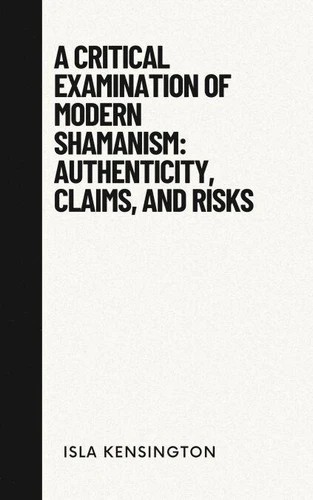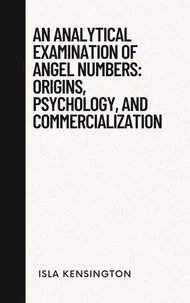A Critical Examination of Modern Shamanism: Authenticity, Claims, and Risks. Debunking Myths Series, #2
Par :Formats :
Disponible dans votre compte client Decitre ou Furet du Nord dès validation de votre commande. Le format ePub protégé est :
- Compatible avec une lecture sur My Vivlio (smartphone, tablette, ordinateur)
- Compatible avec une lecture sur liseuses Vivlio
- Pour les liseuses autres que Vivlio, vous devez utiliser le logiciel Adobe Digital Edition. Non compatible avec la lecture sur les liseuses Kindle, Remarkable et Sony
- Non compatible avec un achat hors France métropolitaine
 , qui est-ce ?
, qui est-ce ?Notre partenaire de plateforme de lecture numérique où vous retrouverez l'ensemble de vos ebooks gratuitement
Pour en savoir plus sur nos ebooks, consultez notre aide en ligne ici
- FormatePub
- ISBN8231842377
- EAN9798231842377
- Date de parution27/07/2025
- Protection num.Adobe DRM
- Infos supplémentairesepub
- ÉditeurWalzone Press
Résumé
"Navigate the spiritual supermarket with caution." Scholar Isla Kensington delivers a vital investigation into the booming world of modern shamanism, separating culturally rooted tradition from potentially dangerous commercial ventures. This timely work exposes how ancient Indigenous practices have been repackaged into a lucrative "neo-shamanic" industry fueled by New Age individualism. Discover the stark divide between authentic shamanism-holistic, community-centered, and passed through generations-and its modern counterpart, where self-proclaimed "plastic shamans" often exploit seekers through costly rituals, cultural appropriation, and unregulated practices.
Kensington examines documented cases of financial fraud, physical harm (including sweat lodge fatalities and ayahuasca-related deaths), and psychological trauma. Grounding her analysis in neuroscience and psychology, she explores how altered states of consciousness "feel" real but don't validate supernatural claims, revealing the powerful role of belief and placebo in perceived healing. Crucially, she highlights the alarming lack of regulation, licensing, or accountability in this multi-million-dollar industry.
More than critique, this book equips spiritual seekers with essential discernment: how to identify ethical practitioners, prioritize safety with psychoactive substances, respect Indigenous sovereignty, and never abandon evidence-based medical care. An indispensable guide for anyone exploring shamanic practices in an age of spiritual consumerism. Essential for seekers, scholars, and advocates demanding integrity in spiritual healing.
Kensington examines documented cases of financial fraud, physical harm (including sweat lodge fatalities and ayahuasca-related deaths), and psychological trauma. Grounding her analysis in neuroscience and psychology, she explores how altered states of consciousness "feel" real but don't validate supernatural claims, revealing the powerful role of belief and placebo in perceived healing. Crucially, she highlights the alarming lack of regulation, licensing, or accountability in this multi-million-dollar industry.
More than critique, this book equips spiritual seekers with essential discernment: how to identify ethical practitioners, prioritize safety with psychoactive substances, respect Indigenous sovereignty, and never abandon evidence-based medical care. An indispensable guide for anyone exploring shamanic practices in an age of spiritual consumerism. Essential for seekers, scholars, and advocates demanding integrity in spiritual healing.
"Navigate the spiritual supermarket with caution." Scholar Isla Kensington delivers a vital investigation into the booming world of modern shamanism, separating culturally rooted tradition from potentially dangerous commercial ventures. This timely work exposes how ancient Indigenous practices have been repackaged into a lucrative "neo-shamanic" industry fueled by New Age individualism. Discover the stark divide between authentic shamanism-holistic, community-centered, and passed through generations-and its modern counterpart, where self-proclaimed "plastic shamans" often exploit seekers through costly rituals, cultural appropriation, and unregulated practices.
Kensington examines documented cases of financial fraud, physical harm (including sweat lodge fatalities and ayahuasca-related deaths), and psychological trauma. Grounding her analysis in neuroscience and psychology, she explores how altered states of consciousness "feel" real but don't validate supernatural claims, revealing the powerful role of belief and placebo in perceived healing. Crucially, she highlights the alarming lack of regulation, licensing, or accountability in this multi-million-dollar industry.
More than critique, this book equips spiritual seekers with essential discernment: how to identify ethical practitioners, prioritize safety with psychoactive substances, respect Indigenous sovereignty, and never abandon evidence-based medical care. An indispensable guide for anyone exploring shamanic practices in an age of spiritual consumerism. Essential for seekers, scholars, and advocates demanding integrity in spiritual healing.
Kensington examines documented cases of financial fraud, physical harm (including sweat lodge fatalities and ayahuasca-related deaths), and psychological trauma. Grounding her analysis in neuroscience and psychology, she explores how altered states of consciousness "feel" real but don't validate supernatural claims, revealing the powerful role of belief and placebo in perceived healing. Crucially, she highlights the alarming lack of regulation, licensing, or accountability in this multi-million-dollar industry.
More than critique, this book equips spiritual seekers with essential discernment: how to identify ethical practitioners, prioritize safety with psychoactive substances, respect Indigenous sovereignty, and never abandon evidence-based medical care. An indispensable guide for anyone exploring shamanic practices in an age of spiritual consumerism. Essential for seekers, scholars, and advocates demanding integrity in spiritual healing.




